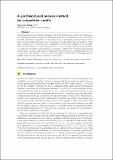Files in this item
A portfolio-based analysis method for competition results
Item metadata
| dc.contributor.author | Dang, Nguyen | |
| dc.date.accessioned | 2022-09-02T15:30:04Z | |
| dc.date.available | 2022-09-02T15:30:04Z | |
| dc.date.issued | 2022-07-31 | |
| dc.identifier | 280770219 | |
| dc.identifier | e87ca23e-3c8a-4ffb-9a04-8c310ed78447 | |
| dc.identifier.citation | Dang , N 2022 , A portfolio-based analysis method for competition results . in ModRef 2022 : 21 st workshop on constraint modelling and reformulation . Online , The 21st workshop on Constraint Modelling and Reformulation , Haifa , Israel , 31/07/22 . < https://modref.github.io/papers/ModRef2022_PortfolioBasedAnalysisMethodForCompetitionResults.pdf > | en |
| dc.identifier.citation | workshop | en |
| dc.identifier.other | ORCID: /0000-0002-2693-6953/work/117211369 | |
| dc.identifier.uri | https://hdl.handle.net/10023/25940 | |
| dc.description | Nguyen Dang is a Leverhulme Early Career Fellow. | en |
| dc.description.abstract | Competitions such as the MiniZinc Challenges or the SAT competitions have been very useful sources for comparing performance of different solving approaches and for advancing the state-of-the-arts of the fields. Traditional competition setting often focuses on producing a ranking between solvers based on their average performance across a wide range of benchmark problems and instances. While this is a sensible way to assess the relative performance of solvers, such ranking does not necessarily reflect the full potential of a solver, especially when we want to utilise a portfolio of solvers instead of a single one for solving a new problem. In this paper, I will describe a portfolio-based analysis method which can give complementary insights into the performance of participating solvers in a competition. The method is demonstrated on the results of the MiniZinc Challenges and new insights gained from the portfolio viewpoint are presented. | |
| dc.format.extent | 11 | |
| dc.format.extent | 808483 | |
| dc.language.iso | eng | |
| dc.relation.ispartof | ModRef 2022 | en |
| dc.subject | Algorithm portfolio | en |
| dc.subject | Algorithm selection | en |
| dc.subject | Constraint programming | en |
| dc.subject | QA75 Electronic computers. Computer science | en |
| dc.subject | NS | en |
| dc.subject | NIS | en |
| dc.subject | MCC | en |
| dc.subject.lcc | QA75 | en |
| dc.title | A portfolio-based analysis method for competition results | en |
| dc.type | Conference item | en |
| dc.contributor.sponsor | The Leverhulme Trust | en |
| dc.contributor.institution | University of St Andrews. School of Computer Science | en |
| dc.contributor.institution | University of St Andrews. Centre for Interdisciplinary Research in Computational Algebra | en |
| dc.identifier.url | https://modref.github.io/ModRef2022.html | en |
| dc.identifier.url | https://www.floc2022.org/ | en |
| dc.identifier.url | https://modref.github.io/papers/ModRef2022_PortfolioBasedAnalysisMethodForCompetitionResults.pdf | en |
| dc.identifier.url | https://arxiv.org/abs/2205.15414 | en |
| dc.identifier.grantnumber | ECF-2020-168 | en |
This item appears in the following Collection(s)
Items in the St Andrews Research Repository are protected by copyright, with all rights reserved, unless otherwise indicated.

